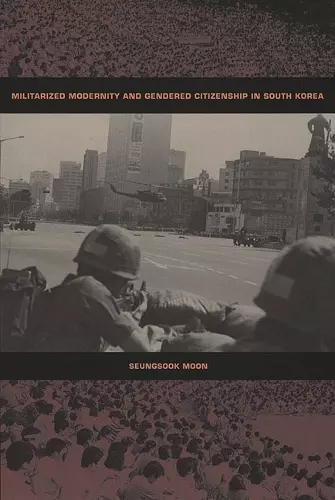Militarized Modernity and Gendered Citizenship in South Korea
Format:Hardback
Publisher:Duke University Press
Published:30th Sep '05
Currently unavailable, and unfortunately no date known when it will be back

A postcolonial feminist study of the formation of contemporary political subjectivities in South Korea, framed by the rise and decline in 20th century militarization
This pathbreaking study presents a feminist analysis of the politics of membership in the South Korean nation over the past four decades. Seungsook Moon examines the ambitious effort by which South Korea transformed itself into a modern industrial and militarized nation. She demonstrates that the pursuit of modernity in South Korea involved the construction of the anticommunist national identity and a massive effort to mold the populace into useful, docile members of the state. This process, which she terms “militarized modernity,” treated men and women differently. Men were mobilized for mandatory military service and then, as conscripts, utilized as workers and researchers in the industrializing economy. Women were consigned to lesser factory jobs, and their roles as members of the modern nation were defined largely in terms of biological reproduction and household management.
Moon situates militarized modernity in the historical context of colonialism and nationalism in the twentieth century. She follows the course of militarized modernity in South Korea from its development in the early 1960s through its peak in the 1970s and its decline after rule by military dictatorship ceased in 1987. She highlights the crucial role of the Cold War in South Korea’s militarization and the continuities in the disciplinary tactics used by the Japanese colonial rulers and the postcolonial military regimes. Moon reveals how, in the years since 1987, various social movements—particularly the women’s and labor movements—began the still-ongoing process of revitalizing South Korean civil society and forging citizenship as a new form of membership in the democratizing nation.
“In this provocative book, Seungsook Moon demonstrates how the South Korean state’s dual push for military security and industrial modernization reinforced gendered distinctions in the citizenry. She skillfully shows the intersection between compulsory military service for men and the marginalization of women in the economy through the symbolic and material valorization of men’s military service. The book masterfully articulates the demands of the state on Korean male and female citizens and the repercussions for the patriarchal family, for class identities among men and women, and for Koreans’ increasingly openly contested claims to the rights of full citizenship.”—Mary C. Brinton, author of Women and the Economic Miracle: Gender and Work in Postwar Japan
“Seungsook Moon has given us a sharp and detailed account of just how a state goes about militarizing men’s sense of their own manliness for the sake of its larger modernity project. This nuanced feminist case study will be of interest to all of us trying to disentangle gendered citizenship from militarized nationalism.”—Cynthia Enloe, author of Maneuvers: The International Politics of Militarizing Women’s Lives
“This clearly written and eminently readable book is a brilliant study of the complex process by which the South Korean nation-state was able to become an industrialized economic power. . . . [T]his book will be very useful to anyone interested in analyses of militarism, postcolonial societies, social movements (particularly labor and women’s movements), nation-state formation, or economic development, and it is a stellar example of why these phenomena require a feminist analysis.” -- Noël Sturgeon * Contemporary Sociology *
ISBN: 9780822336273
Dimensions: unknown
Weight: 531g
272 pages